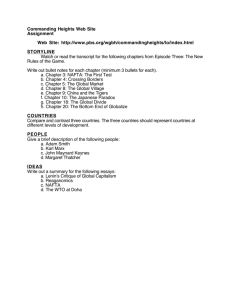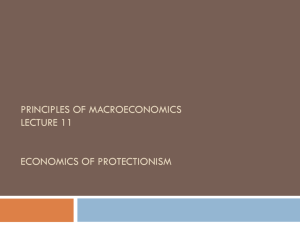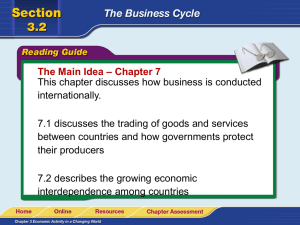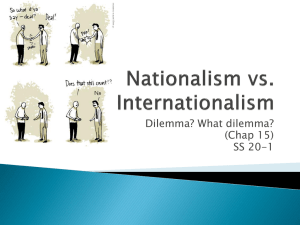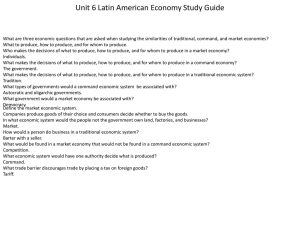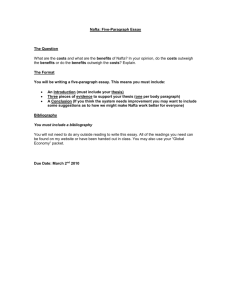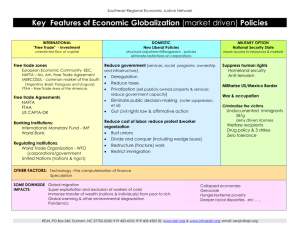Free Trade vs. Protectionism: Dr. Bohanon
advertisement
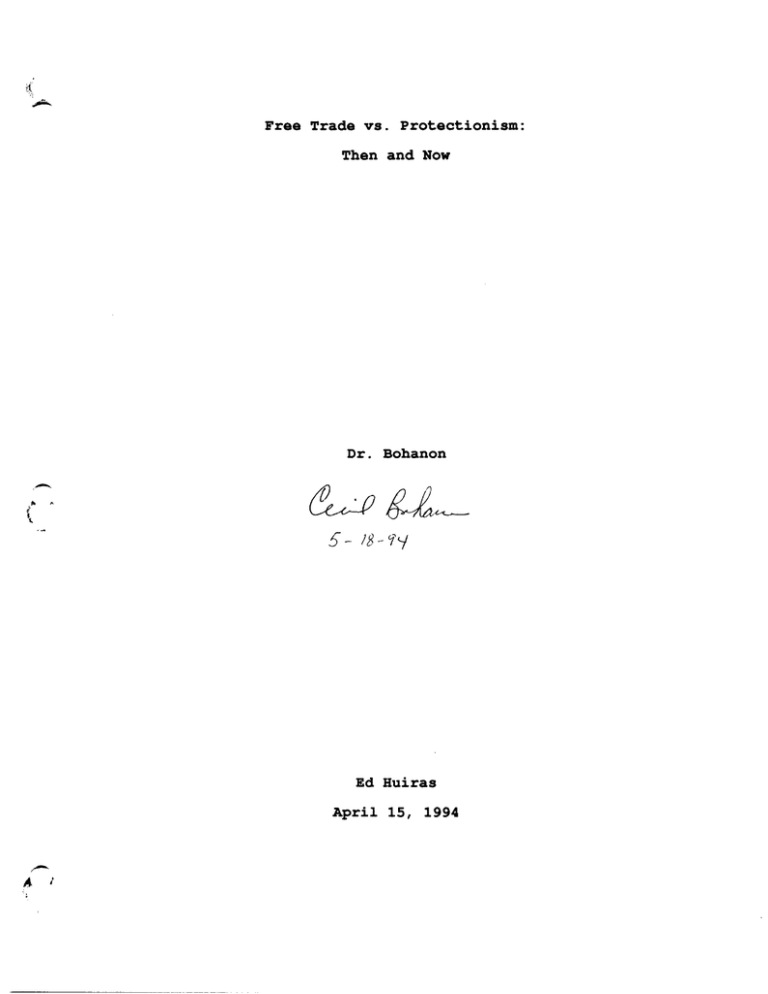
i( ...~ Free Trade vs. Protectionism: Then and Now Dr. Bohanon Ed Huiras April 15, 1994 -------- ._ ..__ . _ - - - - - - _ . - - - - . . ., 1 INTRODUCTION NAFTA. have GATT. become Free trade. commonplace Fair trade. in today's Words like these political arena. International trade policies have come to play an increasingly important role to contemporary leaders. Indeed, global expansion of markets seems to be a panacea for many companies, especially after the recent worldwide recession. aggressively expanding into foreign markets. Companies are Not surprisingly, this is placing pressures on existing trade laws as well as encouraging more trade agreements between the United States and other countries. We have already seen some of this come to pass with the establishment Agreement. of This NAFTA, or the North-American recent phenomenon is not Free limited Trade to the borders of the United States or even to the North-American continent. Other countries are also seeking ways to market their products and services. The EC (European Community) has been and still is trying to establish a European free-trade bloc. Progress has been made on the GATT (General Agreement on Tariffs and Trade) talks as well. The result of this has profound implications not only for the countries and industries involved, but also for the everyday consumer when he\she goes to the grocery store to buy orange - juice. lI_s a result, not everyone is all recent flurry of free-trade agreements. smiles about the Not all is peaches and - 2 cream mostly because not everyone stands to gain when viewed from a narrow perspective. Theoretical apprehensions abound as well that need to be For addressed. many people, free trade means a headache (headaches are subsidized by the government as there is a 43% tariff on imported aspirin into this country) long unemployment Indeed, lines get 1 as images of conjured up in peoples' minds. it equals more than a headache as fears of a reduced standard of living and economic suffering loom over peoples' lives. With so much rhetoric abounding on both sides of the free trade - controversy, issue. I decided to take a closer look at the I wondered if it had ever before played on the minds of so many people with so much emotion as it now does. The focus of this paper compares the present rhetoric about trade with the turn of the century rhetoric on the topic. I learned that the issue of free-trade vs. protection is no stranger to this country or to the politicians and scholars of each of the time periods. Indeed, free-trade vs. protectionism has been debated with as much fervor and emotion in the past as it now is. This paper seeks to take a look at some of the arguments presented by both sides then and now. EMOTIONAL RHETORIC THEN AND NOW IBovard, James. Fair Trade Fraud. York, New York, 1991, p. 17. St. Martin's Press, New - 3 To begin with, it is striking to see the degree to which persons in both time periods were emphatic in their feelings and the fervor to which they held their beliefs on the free trade It issue. is not, though, hard to understand why emotional appeals for a position are easy to form; neither is it hard for certain groups (i.e. political parties) manipulate appeals rooted in emotion, not logic. to As already mentioned, the whole idea of free trade warrants fears of lost jobs and a reduced standard of living and lower wages. People hold strong opinions on issues which they perceive directly relate to their occupation and well-being. Often, the discussion moves out of the realm of theory or science and more - into peoples' political hearts. parties This which are plays often into at the the hand front, of the espousing reasoning which really does not make much sense. The appeal to emotion is not new. One author wrote in March of 1894 that it was " ... not easy to place or keep the tariff issue on a rational basis." 2 This sentiment was echoed by Frank Taussig, the noted scholar on tariff history in the U.S., when he wrote in 1920: lilt is inevitable, in the popular discussion of economic problems, that arguments of the crudest sort should come to the fore. 113 Surely these are examples of the way it used to be. 2Elliott, p. 294. 3Taussig, Frank. Free Trade, The Tariff, and Reciprocity. The Macmillan Company, 1920, p. 6. - 4 Surely society has advanced beyond this--not so. On speaking about NAFTA, one Congressional aide had this to say: "Business thought it could make an intellectual case and win on the merits, but they were wrong. The emotional argument is more compelling."4 Another article from a separate publication states: "The opposition is hellbent on exploiting these fears."s Politicians from both time periods knew the benefits of appealing to the emotions of the populace. As an example, consider the following from William McKinley in November of 1890: "The whole system of cheap things is a badge of poverty, for cheap merchandise means cheap men, and cheap men mean a cheap country." 6 Today, and even in 1890, this would seem to appear almost unbelievable that someone would say this, especially a public figure like patriot of Mr. McKinley. unprecedented highest prices. Apparently loyalty who Mr. McKinley bought things was at a the At any rate, this is most certainly an example of an appeal not rooted in logic. While no one wants to be cheap or to contribute to a cheap country, Professor Sumner (an outspoken economist from 4Direct quote from Robert Matsui (D-Calif.), "NAFTA". Business Week. Sept. 13, 1993, p. 28. SHarbrecht, Douglas. - "NAFTA". Business Week. Sept. 13, 1993, p. 26. 6Bishop, J.B. "Republican Explanations". Nov. 13, 1890, vol. 51, p. 374. Nation. - 5 Yale University) held protectionism to be immoral. 7 He considered it to be a breach of freedom of sorts against the consumer. Damned if you do, damned if you don't, if you will. Trade was and is a very emotional topic. TRADE AND POLITICS THEN AND NOW As mentioned, political parties often found the emotional appeals to be the most useful. Not surprisingly, they did not pay much attention to holding their arguments up to economic scrutiny. However, before going on, some historical background will prove to be both informative. It is important to note that the issue of free-trade at - around the turn of the century was much more of a partisan debate than a theoretical interesting twist. one. There is, however, an At that time, the Democratic Party was the emphatic supporter of free-trade while the Republicans were typically staunchly protectionists. This is opposite of what one would expect in today's environment. Turn of the century Republicans would be appalled to learn that in a recent article addressing NAFTA, the author states that Republicans have the deepest philosophical bond with it (NAFTA and the idea of freetrade) and they had the most to lose should the free-trade accord be de£eated. B The Democratic Party couches itself as - the party that 7Walker, F.A., p. 264. BSeib, Gerald F. "For the GOP, A NAFTA Test All Its Own". The Wall Street Journal. Nov. 3, 1993, p. A16. - 6 represents the "common man". entirely Democrat. Labor union members are virtually Typically, they are resistant to free-trade and favor protectionism in import sensitive industries in an effort to protect their manufacturing jobs. Republicans, on the other hand, currently seek to open foreign markets to American goods and services. As such, they are now more likely to support free-trade measures. ECONOMIC ARGUMENTS THEN AND NOW There theoretical were those grounds, who and sought not to succumb keep to the issue emotional on pleas. Economists have generally reached a consensus that a tariff is a good thing when nations exert some monopoly power. 9 If one country produces a large percentage of the world's output, it can advance its welfare by raising its prices and restricting output to achieve artificially high profits. economist, One free trade John Stuart Mill, brought light to this more than one-hundred years ago. The same result could also be achieved by an export restriction from that country. At the same time, economists are quick to point out that few countries seem to hold this monopoly power. The potential use of retaliatory tariffs by other trading partners make life difficult for the would be monopolist. Probably the issue most often cited associated with the free trade vs. - protection debate is that of wages and jobs. 9Bhagwati, Jagdish., p. 539. - 7 Discussions about wages and This is perhaps where most of the trade policy agreements. emotional arguments jobs seem to go alongside with stern. It, however, can be held up to economic scrutiny. Nowhere was this argument heard as much as with the recent NAFTA debate. Journal, In a 1991 CBS poll cited in the Wall Street 65% reported that they thought protecting American jobs should be the first priority of American foreign policy, while 67% thought that the U.S. should restrict the importation of foreign goods in order to protect American industry.lo This is also where Ross Perot made his now infamous giant sucking sound in reference to the mass exodus of jobs he and others - believed would ensue as a result of the agreement. any jobs were still left in this country, Besides, if they would be at depressed wages as American labor would have to compete with cheap Mexican labor. In their book, Ross Perot and economist/friend Pat Choate argued that while only about 150,000 people would lose their job as a result of NAFTA, placed "at risk". or more of the fully 5.9 million jobs would be They considered a job to be at risk if 20% value of associated with labor costs. output was the result of wages What they failed to mention is that this is the case in many high-tech industries with highly - lODuval, Michael. Street Journal. "The Weak Case Against Nafta". Nov. 11, 1993, p. A8. The Wall - 8 educated workers, where Mexican labor can not compete. l l However, this whole discussion of jobs and wages is in essence nothing new. In an article written in 1892, the author While many may be brings up the notion of depressed wages. lured to support free trade because of the lower prices that may result, he maintained that the lower prices would be more than offset by a decrease in the wage rate to the point where the real wage would actually be lower after free trade than before .12 D. M. Means employs essentially the same argument about reduced wages, except he advocates the opposite viewpoint. He also brings to the discussion a strong shade of bigotry: - "They (protective tariffs) have injured the workingmen not only by reducing their renumerations, but also by stimulating the importation of the less desirable sort of foreigners ... " 13 This is analogous to today. We have heard about how NAFTA will be a good thing since it will stop the illegal immigration of all those Mexicans into this country. So while the country gets to enjoy the benefits of free trade, put up with Presumably, the immigration of all it does not have to the Mexicans either. their lives will be made better by free trade to the point that they no longer have a desire to immigrate to the 11Harbrecht, Douglas. "Is Pat Choate Playing Fast and Loose with NAFTA?". Business Week. Sept. 20, 1993, p. 40. - 12Aldrich, N. W. "The McKinley Act and the Cost of Living". Forum. Oct. 1892, vol. 14, pp. 242-254. 13Means, D.M. "The Practical Tariff Issue". Sept, 8, 1892, vol. 55, p. 179. Nation. - 9 U. S. While our forefathers did not call this phenomenon a giant sucking sound, they referred to it no less endearingly as the Pauper-Labor argument. Frank Taussig addresses this issue quite frequently in his books. same defenses of free-trade And he employs essentially the used today when in both time periods, follows that not all higher paid workers stand to lose to lower paid labor. paids may be more with The point to be competition from lower paid foreign labor. made, dealing efficient and For one, the higher productive. Mr. Taussig himself states that the fundamental cause of high wages is large productiveness of labor, and that so long as such productiveness exists a large reward to workmen will follow. n14 fI • • • Indeed, in the case of the United States and Mexico, this seems to be exactly the case. Cases abound where companies stand to lose by taking advantage of the lower paid labor. Not only do companies run into problems with differing work ethics, but also with language barriers, differing social customs, and a court system that is less than pure in Mexico. What's more, communication and transportation development in Mexico are not on a level with this country. And on and on. There are myriad examples of companies who moved to Mexico to take advantage of low-cost labor only to move back to the United States a short time later, after incurring much expense. A twist emerges here, - though. While persons from both 14Taussig, Frank. Free Trade, The Tariff, and Reciprocity. The Macmillan Co., New York, 1927, p. 7. - 10 time periods screamed of jobs that would be lost, the idea that jobs could be added to an economy is much more prevalent to recent times. While Ross Perot and economist/friend Pat Choate argued the idea that jobs could be added to the U.S. economy in their recent book, most studies supported the indication that NAFTA would add jobs to the U. S. One economy. economist employed by the Federal Reserve cited evidence that NAFTA would create 242,000 jobs displaced by NAFTA. for the U.S. while 112,000 would be This results in a net gain of 130,000 U.S. jobs. 15 In a recent Fortune magazine interview with Alain Gomez, chairman of the French electronics company Thompson. 16 - states that themsel ves governments before the today outdated need to notion stop of Gomez "prostrating" free-trade. The future Mr. Gomez lays out for the reader is ominous. The scare doesn't stop there, either. by others. Not the least of these is James Fallows, editor of Atlantic Monthly magazine. He too cites the growing power of the Japanese in the electronics industry. trade Mr. Gomez is joined policies for the demise of And he blames freethe American semi- conductor/computer chip business. Mr. Fallows, though, goes one step further. one of the hottest trade topics of the day. - 15Moreno, Ramon. "NAFTA and U. S. Jobs". June 24, 1993, no. 93-24, p. 1. 16"The Case Against Free Trade". pp. 159-164. He gets into He advocates a FRBSF Weekly Letter. Fortune. April 20, 1992, - 11 He is not alone managed trade policy for the United States. though, He is as many economists would like to think he is. joined by some of the most influential persons in power in this The country today. chairwoman of the Council of Economic Advisors, Laura D'Andrea Tyson, also supports this approach as do the President and Vice-President of the United States. Mr. while Fallows argues in a recent series of articles that thE! U. S. followed a laissez-faire trade policy, the Japanese aggressively sought to capture the industry--and have met with success. 17 He maintains that the government can beat the market, with Japan and the Pacific Rim as a case in point. This is managed trade. In a separate article, Fallows builds on this, arguing that we as a country should put national economic policy in front of narrow self-interest. 18 He states: "If every person put his money where the return was greatest, the money might not automatically go where it might do the nation the most good. For it to do so requires a plan, a push, an exercise of central power. n 19 However, article this is cited earlier, industries argument". in essence, he mentions not new. what he In the Walker calls the "key Walker advocates in 1890: " ... the domestic production of nearly all articles of prime importance should be so fostered as to render a 17Fallows, James. "Looking at the Sun". Nov. 1993, vol. 272, no. 5, pp. 81-96. ,- 18Fallows, James. "How the World Works." Dec. 1993, vol. 272, no. 6, pp. 66-87. 19Fallows, "How the World Works", p. 66. Atlantic Monthly Atlantic Monthly. - 12 nation practically independent of commerce. ,,20 But what, one may ask, Isn't this good is the problem? that the U.S. can obtain this technology at low cost from the Fallows Japanese? mindset. points to the inherent danger in this He mentions the defense industry. For instance, who would service the machines when they go down? This could be a way for the Japanese to gain power over this country. Also, the possibility of Japanese manufacturers incorporating hard to detect viruses on sensitive computer technology during a war could wreak havoc for the U.S. result, As a Fallows goes as far as questioning the relevancy of traditional Western feels have times economics since the and its classical Smith and Ricardo were alive. relevancy today. free trade He economists This sentiment is echoed by Mr. Gomez, of Thompson electronics. These two reason along the fisherman lines. You know-- give a man a fish he eats for a day; teach him to fish, he eats for a lifetime. Consumers may be better off in the short run, but over the long haul, they see trouble. It is not hard to find high ranking proponents of this either. For government's some, earlier governmental support of support is canals, analogous waterways, to and railroads, and they see no trouble with this. 21 2°Walker, Francis A. "Protection and Protect ionists", p. 251 . 21Scott, Bruce. "Competitiveness: self-help for a worsening problem". Harvard Business Review. July-Aug. 1989, p. 120. - 13 Laura D'Andrea Tyson has been perhaps the most outspoken She does not believe in "the so- person for managed trade. called free market" to the degree that many other economists do. 22 Ms. Tyson scares some economists when she says such things as the fact that: "Free trade is not necessarily and automatically the best policy."23 She goes on further to state that: "The American population is not well served by irrelevant homilies on the merits of free markets and ideological cliches ... "24 Ms. Tyson's ideas are echoed by our Vice-President, Al Gore: "A better national approach to developing and implementing new technologies, especially those by which common agreement are likely to have a tremendous leverage over the future ... " (bold added) 25 One has to be leery of the "by common agreement" part of that quote. This is, in fact, one of the more compelling arguments levied against the entire idea of managed trade. How is it that of Washington is going to come to any sort common agreement on something of this magnitude in a better way than the free market could decide? Billions of dollars could be at 22Goodgame, Dan; quoting Ms. Tyson. June 21, 1993, p. 24. "Trading Punches". Time. 23Wartzman, Rick; quoting Ms. Tyson. "Tyson to Bring NonTraditional Views to Council of Economic Advisers Job". The Wall Street Journal. Dec. 14, 1992, p. A2. 24Tyson, Laura. "An F for Administration ideology". Angeles Times. Mar. 4, 1990, p. 02. Los 25Awanohara, Susumu; quoting Al Gore. "Positive Thinking". Far Eastern Economic Review. Jan. 21, 1993, p. 26. - 14 stake. Do you suppose there is any chance of manipulation or fraud here? It could be argued that this would inevitably lead to waste and corruption. Another advocate of managed trade thinks he has the answer. He feels the decisions should be made by " . .. those who are best qualified to determine what will shape industrial development. "26 Again, one could argue that these persons will inevitably choose the industries where their retirement funds lie. Any time and the government is going to try to pick "winners" "losers" in trade policy, there is bound to be problems. Managed trade is not new, though, either. - was called the infant industry argument. Back then, it Infant industry arguments (also known as educating or nurturing protection) are drawn along the lines that a country should encourage and even play an active role to develop those industries it deems most important. In this way, a newly begun industry would be able to establish itself and eventually become a major world player while it would not have been able to do so under a free-trade scenario. race. The idea is to give the industry a fair start in the One noted economist of the day, John Stuart Mill, lent credibility to this notion when he publicly endorsed the idea. Just as legitimate positions are held against this today, they were then also. How does one know whether or not an industry could ever be profitable in the world marketplace? 26Scott, p. 119. ,- 15 While this was meant to be a protectionist stronghold, it could Since no one really knows if an serve to defeat the purpose. industry would at some future date be able to compete efficiently, then pains should be taken to ensure taxpayers of a good deal. It could be ruinous to sink all sorts of capital into an industry which would never be able to compete. No one wanted industry as of 1890, " .. . to fasten themselves in helpless indignancy upon the public body. ,,27 Also, how long is too long to allow for protection? Almost all supporters conceded that protection was not a permanent thing for the infant industry. Although he preceded the relevant time period here, Henry Clay once said, .- "No one in the commencement of the protective policy ever supposed it was to be perpetual. ,,28 While Frank Taussig, the noted expert on American tariff policy, did not entirely dismiss the idea, he wrote as early as 1892 that the conditions for infant industry type protection probably no longer existed. 29 But again, think of Japan. government/business relationship compete with support. with that, This would the seem There there. electronics to be We is industry refuted, strong simply though, 27Walker, F. A. "Protection and Protectionists". Journal of Economics. April 1890, p. 256. - a cannot cited as as one Quarterly 28Walker, p. 251. 29Taussing, Frank. Tariff History of the United States. Putnam's Sons, New York, 1892, p. 67. G.P. - 16 economist points out that in his study " .. . some of the most successful American exporting industries ... have been sectors that Japan has targeted most aggressively with trade policies.,,30 He goes on further that "only a handful of the more than 60 industries targeted by MITI have ever achieved significant international success. More common are Japanese targeting failures." He also found in his study that targeted U.S. industries did less well at exporting. Be it. t~at as it may, the proponents of today are not buying In fact, they have a new sophistication to their arguments not present 100 years or so ago. Almost all advocates of managed trade today rely on the countervailing subsidy to help - out neglected U.S. industries. This, too, can become mired in bureaucracy as Bovard also points out well in his book (pp. 169-191) . There are Constitutional constraints as well to managed trade in this country. managed trade violate antitrust laws beyond a certain point, and rightly so. What's more, Talks about all government meetings must be open to the press and public. It would be hard indeed to establish international trade policy, with huge sums of money in consideration, in this manner. Nevertheless, the managed trade wheels are spinning. In 1988, a Competitiveness Policy Council was created which acts - 30Dick, Andrew R. "Protectionism: What a Drag". Street Journal. Apr. 4, 1994, p. A13. The Wall - 17 in an advisory manner to the president. current position of the chair of With this council, the the Council of Economic Advisors, and a sympathetic executive branch, the managed trade advocates ought to be feeling at least a little good. degree to which they will be successful in The forming public policy remains to be seen. CONCLUSION Whatever the future may hold for this policy, probably only one thing is certain. country's trade The arguments used one-hundred years ago, many of which are being echoed today, will be used in the future, sure. As an example, with some interesting twists for consider the following quote written almost exactly one-hundred years ago: "Inventions and discoveries have changed the organization and direction of industry. The country has advanced from a feeble industrial beginning to a foremost place among the nations in wealth ... yet the same tariff question returns with perennial freshness, marshalled by pretty much the same arguments that held sway in the decisive times. ,,31 One-hundred years later this quote still holds true, and I suspect it will one-hundred years from now as well, "in the decisive times". -- 31Elliott, O.L. p. 282. 18 - - 19 Works Cited 1. Aldrich, N.W. "The McKinley Act and the Cost of Living". Forum. Oct. 1892, vol. 14, pp. 242-254. 2. Atkinson, E. "Common Sense Applied to the Tariff Question". Popular Science. Aug.-Sept. 1890, vol. 37, pp. 433-458, 591-607. 3. Awanohara, Susumu; quoting Al Gore. "Positive Thinking". Far Eastern Economic Review. Jan. 21, 1993, p. 26. 4. Bhagwati, Jagdish. Edited by David R. Henderson. "Protection". The Fortune Encyclopedia of Economics. Warner Books, Inc., 1993, New York, New York, 1993, pp. 539-541. 5. Bishop, J.B. "Republican Explanations". 13, 1890, vol. 51, p. 374. 6. Bovard, James. The Fair Trade Fraud. New York, New York, 1991. 7. Davis, Bob. "The New Demon". Oct. 20, 1993, p. A5. 8. Dick, Andrew R. Street Journal. "Protectionism: What a Drag". Apr. 4, 1994, p. A13. The Wall 9. Duval, Michael. Street Journal. "The Weak Case Against NAFTA". Nov. 11, 1993, p. A8. The Wall 10. Elliott, E.L. "Ethics of the Tariff Controversy". Overland Monthly. March 1894, vol. 38, pp. 281-294. 11 Fallows, James. "How the World Works". Dec. 1993, vol. 272, no. 6, pp. 66-87. Atlantic Monthly. 12. Fallows, James. "Looking at the Sun. " Nov. 1993, vol. 272, no. 5, pp. 81-96. Atlantic Monthly. 13. Goodgame, Dan; quoting Ms. Tyson. Time. June 21, 1993, p. 24. 14. Harbrecht, Douglas. 1993, p. 26. 15. Harbrecht, Douglas. "Is Pat Choate Playing Fast and Loose With NAFTA?". Business Week. Sept. 20, 1993, p. 40. 16. "NAFTA". Nation. Nov. St. Martin's Press, The Wall Street Journal. "Trading Punches". Business Week. Means, D.M. "The Practical Tariff Issue". 8, 1892, vol. 55, p. 179. Sept. 13, Nation. Sept. - - - 20 17. "NAFTA and U.S. Jobs". FRBSF Weekly Moreno, Ramon. Letter. June, 24, 1993, no. 93-24, p. 1. 18. Scott:, Bruce. "Competitiveness: self-help for a worsening problem". Harvard Business Review. July-Aug. 1989, p. 120. 19. Seib, Gerald F. "For the GOP, A Nafta Test All Its Own". The Wall Street Journal. Nov. 3, 1993, p. A16. 20. Taussig, Frank. Free Trade, The Tariff, and Reciprocity. The Macmillan Company, 1920. 21. Taussig, Frank. Tariff History of the United States. G.P. Putnam's Sons, New York, New York, 1892. 22. "The Case Against Free Trade". pp . 159 -1 64 . 23. Tyson, Laura. Angeles Times. 24. Walker, F.A. "Protection and Protectionists". Journal of Economics. April 1890. 25. Wartzman, Rick; quoting Ms. Tyson. "Tyson to bring NonTraditional Views to Council of Economic Advisors Job". The Wall Street Journal. Dec. 14, 1992, p. A2. Fortune. Apr. 20, 1992, "An F for Administration Ideology". Mar. 4, 1990, p. D2. Quarterly
